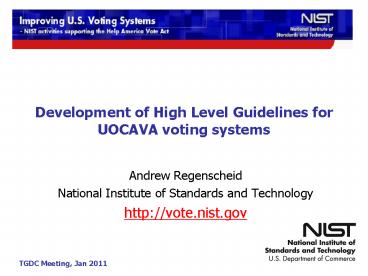Development of High Level Guidelines for UOCAVA voting systems - PowerPoint PPT Presentation
Title:
Development of High Level Guidelines for UOCAVA voting systems
Description:
Page * Approach (1) Identified Council of Europe recommendations, Legal, Operational and Technical Standards for E-Voting, as starting point. – PowerPoint PPT presentation
Number of Views:102
Avg rating:3.0/5.0
Title: Development of High Level Guidelines for UOCAVA voting systems
1
Development of High Level Guidelines for UOCAVA
voting systems
- Andrew Regenscheid
- National Institute of Standards and Technology
- http//vote.nist.gov
2
Background (1)
- EAC tasked TGDC with the development of
guidelines for testing and certifying of
electronic absentee voting systems. - TGDC established UOCAVA Working Group.
- The UOCAVA Roadmap submitted to Congress by the
EAC calls for the development of high-level
non-testable guidelines for remote electronic
absentee voting systems by Spring 2011.
3
Background (2)
- EAC/NIST/FVAP UOCAVA Roadmap
- EAC and the TGDC, with technical support from
NIST, and input from FVAP, will identify
high-level, non-testable guidelines for remote
electronic absentee voting systems. This effort
will focus on the desirable characteristics of
such systems and serve as a needs analysis for
future pilots and research and for the purposes
of driving industry to implement solutions.
Page 3
4
Approach (1)
- Identified Council of Europe recommendations,
Legal, Operational and Technical Standards for
E-Voting, as starting point. - Included legal and procedural items out-of-scope
for our purposes. - Lacked comprehensive security, usability and
accessibility guidelines. - The CoE recommendations were reviewed and a
subset of the recommendations were extracted. - Recommendations related to election
administration, election law, and instructions
for election officials were not included. - Recommendations related to technical aspects of
design, implementation, and deployment of
election equipment were included.
5
Approach (2)
- The subset of the recommendations were initially
modified. - A point was reached where clarity about how the
high level guidelines would be used was needed
for the group to move forward. - The working group asked the EAC to take a pass at
modifying the subset of the recommendations. - This resulted in a second document with high
level guidelines based on VVSG, Pilot Testing
Requirements, Operation BRAVO requirement, SERVE,
etc.
6
Next Steps
- To meet the UOCAVA Roadmap Spring 2011 deadline,
the EAC and NIST will work to complete the
document initially provided by the EAC while the
working group focuses on other activities.
7
What Now (1)
- David Wagner suggested focusing on differences
between polling place and remote voting systems. - Some areas unlikely to need substantially new
requirements. - Core requirements
- Software requirements
- Usability
- Other areas may need substantial changes.
- Security
- Accessibility
Page 7
8
What Now (2)
- We can develop testable requirements in a
piecemeal fashion. - Some areas are ripe for guidelines development.
- Electronic voter authentication
- Communications channel security
- Accessibility
- Other areas will require additional research and
possibly technological improvement. - Auditability of remote electronic voting systems
- End-point security
Page 8
9
Proposed Resolution (1)
- High level guidelines for UOCAVA voting systems
- The TGDC requests the EAC and NIST complete the
high level guidelines for UOCAVA voting systems
initially started by the UOCAVA working group. - This responds to the request in the Report to
Congress on EACs Efforts to Establish Guidelines
for Remote Electronic Absentee Voting Systems
for the TGDC to assist the Election Assistance
Commission in identifying high-level,
non-testable guidelines for remote electronic
absentee voting systems.
10
Proposed Resolution (2)
- Guidelines development for UOCAVA voting systems
- The TGDC requests the UOCAVA working group begin
developing guidelines for UOCAVA voting systems
in key areas where there are significant
differences between polling place and remote
voting systems and technology exists to address
these differences.































